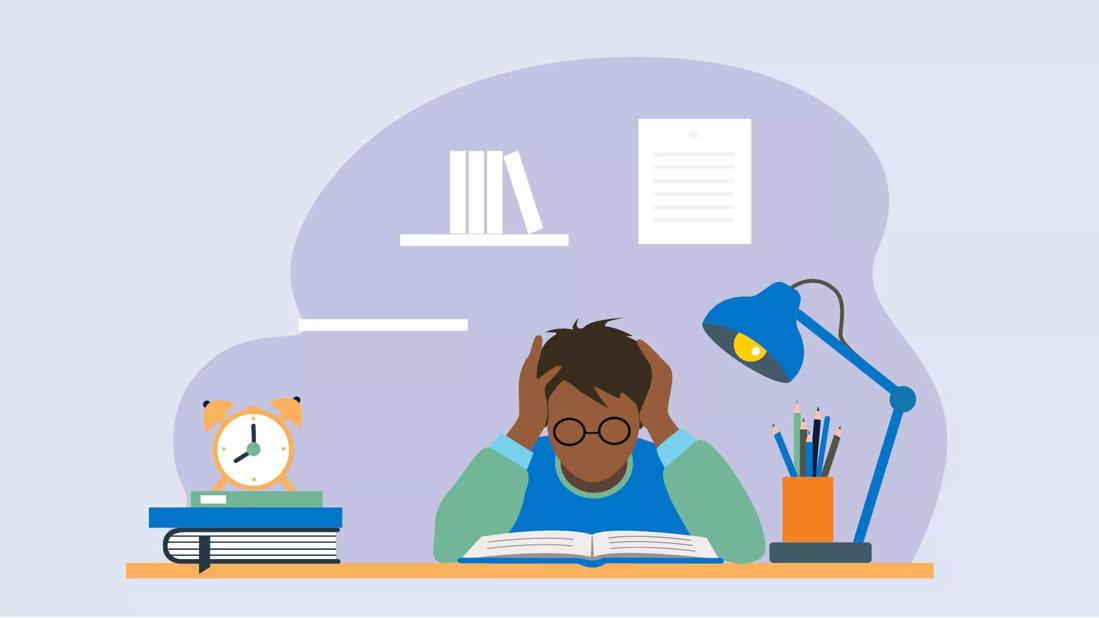Focus on a positive mindset, strong study habits and healthy living

Kids know all about testing. It starts in kindergarten and continues right up until graduation day. These constant assessments bring a certain pressure to succeed, too — and every child knows it.
Advertisement
Cleveland Clinic is a non-profit academic medical center. Advertising on our site helps support our mission. We do not endorse non-Cleveland Clinic products or services. Policy
That may be why test anxiety seems to be at an all-time high among students.
So, what can you do if your child breaks out in a cold sweat at the mere thought of seeing a multiple-choice question? Let’s get some answers from pediatric psychologist Ethan Benore, PhD.
Questions demand answers — and that’s a reality that can cause serious internal tension.
“Anxiety is your body’s reaction when it senses a potential threat,” explains Dr. Benore. “It’s an attempt to gear up energy so you can perform your best and meet the challenge. A lot happens physically and physiologically.”
Stress over an upcoming test can trigger adrenaline hormone surges, leading to:
It’s part of your body’s natural “fight-or-flight” survival response that dates to prehistoric times. Test anxiety is basically your body turning a history exam into the 21st-century equivalent of escaping a saber-toothed tiger.
There’s a definite downside to that sort of exaggerated reaction to an exam.
“When taking a test, most often, we just need to sit still and calmly think about what we’ve learned in order to succeed,” says Dr. Benore. “There’s a disconnect in terms of what your body is doing to prepare you and what you actually need to do to be successful.”
Advertisement
Fretting over an upcoming academic exam isn’t unusual. By some estimates, 40% of students experience test anxiety.
Now, will your child just come out and tell you they’re terrified of taking a test? Probably not. But Dr. Benore says there are signs that may point to testing uneasiness that interferes with academic performance.
Indicators include:
Low grades may hint at trouble, but test anxiety doesn’t always bring a drop in scores. A child with a flawless 4.0 GPA also may be worrying themselves sick over their exams, cautions Dr. Benore.
“Even with good grades, some students may constantly be worried about their performance,” he says.
Video content: This video is available to watch online.
View video online (https://cdnapisec.kaltura.com/p/2207941/sp/220794100/playManifest/entryId/1_azhgp79t/flavorId/1_5f3sgelj/format/url/protocol/https/a.mp4)
Unlike a math problem, there’s no single right answer when it comes to resolving test anxiety. But there are ways to approach the situation that can put your child in a position to perform their best.
Let’s break them down.
Cramming the day before an exam isn’t the best route to success. It’s also not the best approach to tame test anxiety.
Things done at home on a day-to-day basis can supply a solid foundation for success, says Dr. Benore. Here are four ways to get your student in their best place mentally and physically for future tests.
Work with your child to identify the study habits that work best for them. Chatting with their teacher also can be beneficial. “It’s important to understand how your child learns,” advises Dr. Benore.
Advertisement
Try to set up distraction-free zones and times for your child to do homework. Creating a sense of calm — maybe with soft music playing — can help them better focus on the material.
“Your brain is going to do a much better job encoding or learning information in a distraction-free environment,” notes Dr. Benore. “Ideally that means no cell phones, no TVs and no excess chatter.”
Establishing a study mindset can help build skills and confidence to ease future test anxiety.
“There is a time for play and a time to get work done,” he emphasizes. “Helping your child understand that is part of teaching them good work habits so they can be at their best.”
There’s a temptation to hit the books HARD before a test — but more studying doesn’t always translate into positive results.
“There’s only so much the brain can focus on for a set period of time,” says Dr. Benore. “It needs periods of rest and recovery.”
A 30-minute to 45-minute “mental break” can help reduce stress or tension that may build during a study period. The time can go toward grabbing a snack, scrolling through social media or some physical activity. A quick nap isn’t a bad idea either.
“It may seem counterproductive,” says Dr. Benore, “but stepping away can sometimes get you farther ahead.”
Advertisement
Let’s start with some good news! If your child followed the above tips, odds are they’re in a good place heading into their test. (“The pre-work matters,” emphasizes Dr. Benore.)
But as the test draws closer, encourage your child to:
Doing everything right heading into a test doesn’t mean your child won’t be nervous when they pick up that pencil. The solution? Talk to your child about using breathing techniques to destress.
High stress and anxiety often trigger shallow breathing and breath-holding. This robs the brain of oxygen, hampering memory recall, focus and concentration at test time, which can escalate those nervous feelings.
“Slow breaths in and out can reduce a lot of tension in the body to let you perform your best,” says Dr. Benore.
Test anxiety (or performance anxiety) happens. It happens to many different people from all walks of life. It can happen in school or outside of class. It could happen once or it could happen regularly.
Advertisement
The takeaway from all of that? Test anxiety is a normal human reaction.
Trying the tips above may help your child work through test anxiety. If those nervous feelings grow and begin to interfere with their life, talk to your healthcare provider or a mental health professional and ask for an evaluation.
“View test anxiety as a learning opportunity,” says Dr. Benore. “We are all challenged with different things throughout life. Tests are just very structured ways to learn how to meet and overcome obstacles.
“If you approach it that way, you will learn skills that can help inside of the classroom and in other aspects of life, as well.”

Sign up for our Health Essentials emails for expert guidance on nutrition, fitness, sleep, skin care and more.
Learn more about our editorial process.
Advertisement

Preschool age is typically between 3 and 5 — but readiness may matter more

Asking questions, creating routines and setting schedules can help get students back on track

All states require DTaP, MMR, polio and chickenpox vaccines — healthcare providers recommend others, too

School can be stressful, even anxiety-provoking — get to the root of the concern and enlist help when needed

A well-balanced lunch should include a protein, whole grain, fruit and vegetables, and a healthy snack

‘Active shooter’ exercises may raise both awareness and anxiety

Vomiting and fevers are a hard no — other symptoms are a judgment call

College is a time of big transitions, intense stress and major lifestyle changes

Even small moments of time outdoors can help reduce stress, boost mood and restore a sense of calm

A correct prescription helps your eyes see clearly — but as natural changes occur, you may need stronger or different eyeglasses

Both are medical emergencies, but they are very distinct events with different causes